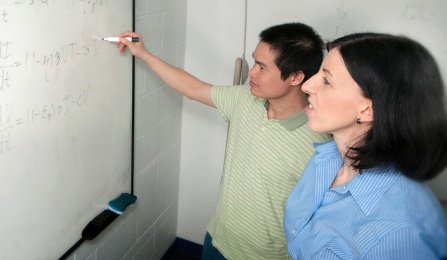Research and Scholarship

You'll collaborate with mentors specializing in a range of areas, including biostatistics research expert Rositsa Dimova, PhD, who can advise you on statistics for your research.
Research skills are a key component of a successful clinical practice and academic career. Our fellowship will familiarize you with new research advances in gastroenterology and develop your critical thinking skills as you evaluate and work with novel scientific concepts.
Wide Selection of Research Opportunities
In our program, you can collaborate with world-class faculty on research projects investigating the development, treatment and prevention of gastrointestinal disorders. Our faculty will support your interests in a range of approaches to research: laboratory, clinical and library-based research.
Our faculty, who have ongoing research projects, offer plentiful research opportunities in areas including:
- therapeutic endoscopy
- malabsorption and nutritional and metabolic aspects of digestive diseases
- the role of vitamin D deficiency in disorders like inflammatory bowel disease and colorectal cancer
- understanding brain-gut interactions in patients with irritable bowel syndrome
- women's health issues
- studies examining quality assurance in clinical practice
Vibrant Research Community
Our faculty members conduct research at:
We maintain strong research collaborations with other divisions within our department and other departments in the medical school. In addition, we collaborate with universities across the nation.
To help you maximize your research skills, we enable you to engage in research rotations designed to stimulate meaningful and productive research, along with our multidisciplinary conference, journal club, pathophysiology and pathology conference, research seminars and grand rounds.
Cross-Disciplinary Research Opportunities
In our division, you'll have unique opportunities to engage in research with faculty members specializing in:
- biostatistics
- physiology and biophysics
The unique research support you'll receive can help you gain a competitive edge when you submit abstracts to national gastroenterology meetings.
Our biostatistics expert is able assist you with the statistical aspects of your research. The biostatistical research support available in our program can provide you with rich opportunities to incorporate biostatistical data into your manuscripts.
As a fellow in our program, you’ll develop studies under the guidance of our physiology and biophysics expert. You may have opportunities to conduct research concerning neurotransmitter and hormone-mediated anion secretion by gastrointestinal secretory tissues like intestinal crypts and liver ducts.
Unique Training in Biomedical Research
We’re devoted to helping you excel in your research endeavors, so we offer a specialized summer program that introduces you to the core skills required for carrying out successful research.
Attend National Meetings
The financial support we provide enables you to attend at least one national meeting. Researchers in our division present at national meetings and gatherings including:
- American College of Gastroenterology's annual meeting
- Annual meeting of the European Association for the Study of the Liver
- Digestive Disease Week
- Gastrointestinal Cancers Symposium
Attending and presenting at these conferences helps you see the broader implications of your research findings while forming potentially collaborative relationships with investigators from other institutions.
Master the Publication Process
Our fellows have strong publication records; we are attentive to your ideas and encourage you to publish your work in peer-reviewed journals.
Our oft-published faculty will guide you as you embark on the process of writing an abstract, delivering oral or poster presentations and preparing for publication. We will provide you with support to ensure that you are equipped to attend national meetings.
Research Track and Clinical Track
If you select the research track of our program, you'll devote at least 13 modules to your research endeavors over the course of the fellowship.
If you're a fellow on our clinical track, you'll spend seven modules in our research rotation.
Our Program at a Glance
Choosing the Right Fellowship
Upcoming Events
No events scheduled.
